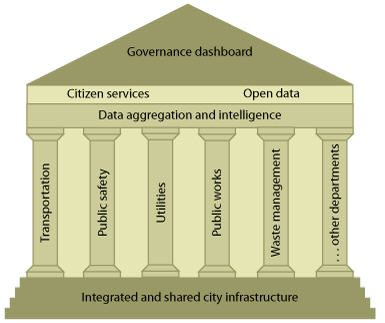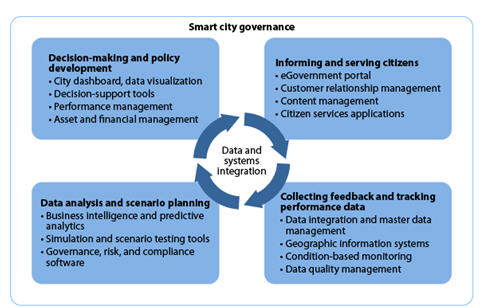The Key To Being A Smart City Is Good Governance: “Smart Governance”

What’s it take to be a smart city? Is it smart transportation, such as sensors in parking spaces that call out to drivers like sirens calling to Ulysses as he headed back to Ithaca? Or parking meters sending SMS messages to alert those parked that their time is up, like a baby bird calling to be fed? Is it smart buildings that turn the lights on when you enter or off when you leave? Is it smart waste management? Is it smart energy grids? Is it smart water systems? Or smart administration? All of these help make city services and operations more efficient. But the real key to being smart is to have an overall management system that allows leaders to coordinate across these smart systems, capturing and sharing the data generated and using it to inform new policies and city programs. Smart cities require good – “smart” – governance and the processes and tools that enable it.
Increasingly, city leaders are adopting enterprise management practices – and technologies – in order to improve city governance. Smart city leaders:
- Match budgeted spending with performance objectives.
- Adopt enterprise apps such as EAM, ERP, and CRM in shared or cloud models.
- Appoint professional operational and IT management to coordinate.
- Implement regular process and performance reviews – and supporting technologies.
- Establish integrated reporting for greater transparency.
 All of these provide opportunities for technology vendors and service providers.
All of these provide opportunities for technology vendors and service providers.
In a previous blog post, I discuss the efforts to better inform and serve citizens through open data and 311 initiatives. These services provide additional mechanisms for collecting direct feedback. Combining this data with program performance tracking and data analytics tools, city leaders are able to do scenario planning and make more informed policy decisions, completing the cycle of smart city governance. The graphic above illustrates the cycle with the technologies that enable each step – and highlights the central role of data and system integration.
Making a city smart is a complex, multi-technology undertaking, requiring a wide range of tools to bring it all together. Many smart city projects have started with the most critical pain points in the city – which makes sense. But technology providers must focus on the bigger picture as well as the sector-specific offerings. Good governance requires integration, data capture and analytics, and better tools to enable city leaders to leverage this data to better serve their citizens.
Take a look at my new report, Smart City Leaders Need Better Governance Tools: Smart City Governance Brings New Opportunities For Tech Providers.
And tune into my Forrester teleconference on May 19, The Core Of A Smart City Must Be Smart Governance.
I’m always looking for great smart city and smart city governance stories.
And, of course, feedback welcome.